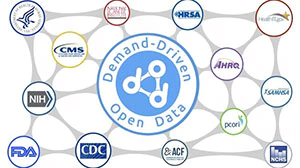Demand-Driven Open Data
Executive Summary
 Demand-Driven Open Data (DDOD) is a component of the U.S. Department of Health and Human Services (HHS) Health Data Initiative (***) (HDI) represented publicly by HealthData.gov. DDOD is a framework of tools and methods to provide a systematic, ongoing and transparent mechanism for industry and academia to tell HHS more about their data needs.
Demand-Driven Open Data (DDOD) is a component of the U.S. Department of Health and Human Services (HHS) Health Data Initiative (***) (HDI) represented publicly by HealthData.gov. DDOD is a framework of tools and methods to provide a systematic, ongoing and transparent mechanism for industry and academia to tell HHS more about their data needs.
This project actually began with a different focus, “Innovative Design, Development and Linkages of Databases.” After extensive discovery across HHS’s Operating Divisions and Staff Divisions, a trend began to unfold from the original project focus on data linkages to an understanding that some of the greatest value that can be created with existing data. We recognized that the most innovative linkages (that we could not have predicted internally) are done by industry, researchers and citizen activists, and we need to enable that. That’s how the concept of Demand-Driven Open Data (DDOD) emerged. Where DDOD is demand-driven predominantly from outside of HHS, the Health Data Initiative is the supply-driven counterpart that is guided by subject matter experts throughout HHS. HealthData.gov is the data indexing and discovery platform for the HDI.
Within the DDOD process, all open data requests efforts are managed in terms of “use cases”, enabling better allocation of limited resources and ensuring that each release has real and immediate value to growing community of data users (see current list of DDOD use cases). It’s the Lean Startup approach to open data serving the user community including (but not limited to) : industry, academia, media, nonprofits and even other government organizations. As resources allow, we’re planning to improve the discoverability and linkability of datasets and APIs that are covered by each use case. Working a use case provides a great opportunity for such improvements by adding ontological tagging, extended dataset-level metadata, full data dictionaries, defined cross-dataset relationships, as well as improving the quality and completeness of the dataset catalog (DCAT) fields.
A project supported by the: HHS Entrepreneur-in-Residence Program
Team Members
Entrepreneur-in-Residence
David Portnoy
Internal Team
Damon Davis, HHS IDEA LAB, HHS
Keith Tucker, OCIO, ASA
Cynthia Colton, OCIO, ASA
Milestones
September 2014: Entrepreneur-in-Residence Project begins


